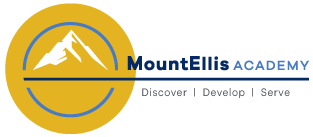Our teachers open doors, even when they are outdoors.
Great teachers and interesting classes are the core of what makes our academic program outstanding. An MEA education will prepare for the academic, spiritual, and life challenges you will face in college and beyond. We start with a rigorous academic curriculum. Then we integrate our thoughtful religion and ministry programs. Plus, you’ll find an excellent mix of sports, arts, music, science, and history.
English
English I
English I introduces students to foundational skills and thinking processes necessary to the study of literary and informational works, some of which are chosen by the teacher and others self-selected. To closely read and interpret a wide variety of reading material, students are asked to consider the following: the main ideas in a work and the author’s approach towards it; the supporting details an author includes in developing an idea or particular effect; sequential, comparative, and cause-effect relationships within the body of a work; meanings of words; and generalizations and conclusions that can be supported through close reading. Writing skills are integrated into the readings, which are often used as mentor texts, aiding students in the development of their own techniques and writing styles. Within the context of a collaborative, writing-workshop type approach, students work on: developing a topic in terms of purpose and focus; organizing their writing for improved unity and coherence; refining word choice in terms of style, tone, clarity, and economy; polishing sentence structure and formation; and effectively employing the conventions of writing in both usage and punctuation.
English II
Through a sustained focus on book-length works of literature, students in English II further develop their reading, writing and communication skills. In reading, these include the ability to infer the main idea or purpose of a work and understand the overall approach taken by an author in terms of point of view, use of concrete details, figurative language and so on. Students are also asked to identify clear relationships between people and ideas, use context to determine the appropriate meaning of words and phrases, and assert generalizations and draw conclusions about different characters and ideas encountered in the literature. Within a writing-workshop approach, students continue to hone their abilities in developing a central idea or topic, including transitions between paragraphs, revising their writing to delete redundant material, appropriately using phrases and clauses to vary sentence structure, and improving use of punctuation and grammar.
English III
Students in English III continue developing their skills while reading book-length works of American literature. At the English III level, while reading, students are expected to locate details and events that support important points or ideas present in a work of literature. They must also understand implied or subtly stated cause-effect relationships as well as identifying those more clearly expressed. Additionally, students must be able to explain how the style of a work of literature (point of view, figurative language, sentence structure) contributes to an understanding of the author’s overall purpose in a work. Students are expected to continue using context clues to determine the meaning of words even when the language is richly figurative and the vocabulary difficult. In English III, students continue to improve their writing skills through collaborating in a writing workshop style environment. Students are expected to identify the rhetorical effects of a particular writing style, aligning it with the author’s purpose and audience. They also must continue using an understanding of phrases and clauses to avoid comma splices, run-on sentences, and sentence fragments. In organizing their writing, students focus on arranging sentences to improve the logic and coherence of a complex paragraph, and they use rhetorical techniques such as parallel structure to increase effectiveness. The importance of word connotations—informal vs. formal for example — are considered within the context of the author’s writing task as well as revising writing for redundant material.
English IV
English IV centers on book-length works of British literature. Moreover, in addition to working on the continued development of reading, writing, and communication skills for college, English IV students have the option of showcasing skills and talents to a broader community through drama. “Senior Projects” are another component of English IV that provide students with an opportunity to apply what they have learned in English class outside of a traditional classroom setting. To complete a project, students must research a topic, incorporate their findings in a formalized essay, and apply their findings in a “real world” context.
